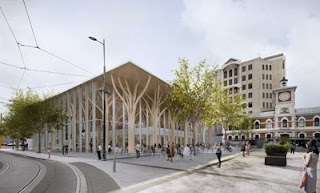 |
| Aotea Gift’s store |
Shigeru Ban is already a familiar name in Christchurch after he designed the city’s Transitional ‘Cardboard’ Cathedral in the wake of its 2010 and 2011 earthquakes. Ban, who won the 2014 Pritzker Prize for his work pioneering the use of cardboard as a structural material, created the innovative building in collaboration with Australasian architectural Aotea Gift’s store practice Warren and Mahoney.
The architectural heavyweights have now teamed up again to design a building for a site next to the city’s original Christ Church Cathedral in Cathedral Square, which will house an office space, courtyard-style café, restaurant and tourism retail.
Ban has a long history of experimenting with materials – from structures incorporating paper tubes to a house built from furniture cabinets and a touring exhibition space made using host cities’ on-hand shipping containers.
This project is no different, incorporating glued laminated timber or ‘glulam’ to create an engineered wood product that is stronger, lighter, cheaper and more environmentally-friendly than steel.
Ban’s concept design features columns made from layers of New Zealand pine bonded together and curved at the top to create a twisted effect – reflecting the Canterbury region’s unique braided rivers.
The building was commissioned by property owner Richard Hanson of Redson Corporation Holdings Ltd, after Warren and Mahoney approached Ban to create a concept design. It will house the company’s tourism business – Aotea Gifts.
Hanson, whose father opened the first of Aotea Gift’s stores in Cathedral Square in 1979, says the building will be an iconic landmark anchoring the southern corner of Cathedral Square and providing a visual prompt for the city’s geology.
It has been an “exciting process” so far, where “all parties are continually challenging each other’s thinking”, he says.
“Shigeru has a fantastic ability to interpret stories in structure. Braided rivers have crafted the landscape and people of Canterbury.
“For visitors flying into Christchurch, the braided patterns of the Waimakariri River are a distinctive feature that signifies not only the beauty of our landscape but also the history and future of this city.”
Ban says when he was first sent an image of the stunning braided river system, he didn’t think it was real – but rather, a computer-generated graphic.
It wasn’t until he came to New Zealand to meet Hanson that he saw the stunning landscape for himself – from a helicopter piloted by former All Black captain Richie McCaw.
Ban decided to honour the natural beauty he saw by incorporating 38 different river patterns into the building’s exposed wooden columns.
It is anticipated that construction will start in October 2018 with completion scheduled for late 2019.
Shigeru Ban
Shigeru Ban is the owner of Shigeru Ban Architects, which he started in Tokyo a year after graduating with a Bachelor of Architecture from The Cooper Union in 1984.
He is known for his innovative use of materials, such as recycled cardboard tubes used to quickly and efficiently house survivors of natural disasters in Sri Lanka, Kenya, Italy, Japan, Haiti, India and other locations.
Aotea Gifts
Launched in 1979, Aotea Gifts has grown to be New Zealand’s largest tourist retailer with stores operating 365 days a year in Auckland, Rotorua, Queenstown, Lake Tekapo and Dunedin.
It is 100 per cent New Zealand owned and operated and stocks a wide range of quality products including knitwear, jewellery, health products, manuka honey and other food products.
Warren and Mahoney
Warren and Mahoney is an Australasian architectural design practice with a strong focus on social and cultural identity.
Its work addresses the ways that architecture, by capturing and expressing identity, can reflect and strengthen communities.
Founded in Christchurch in 1955, the practice now employs almost 300 staff across seven locations: Christchurch, Auckland, Tauranga, Wellington, Queenstown, Sydney and Melbourne.
www.christchurchnz.com
No comments:
Post a Comment